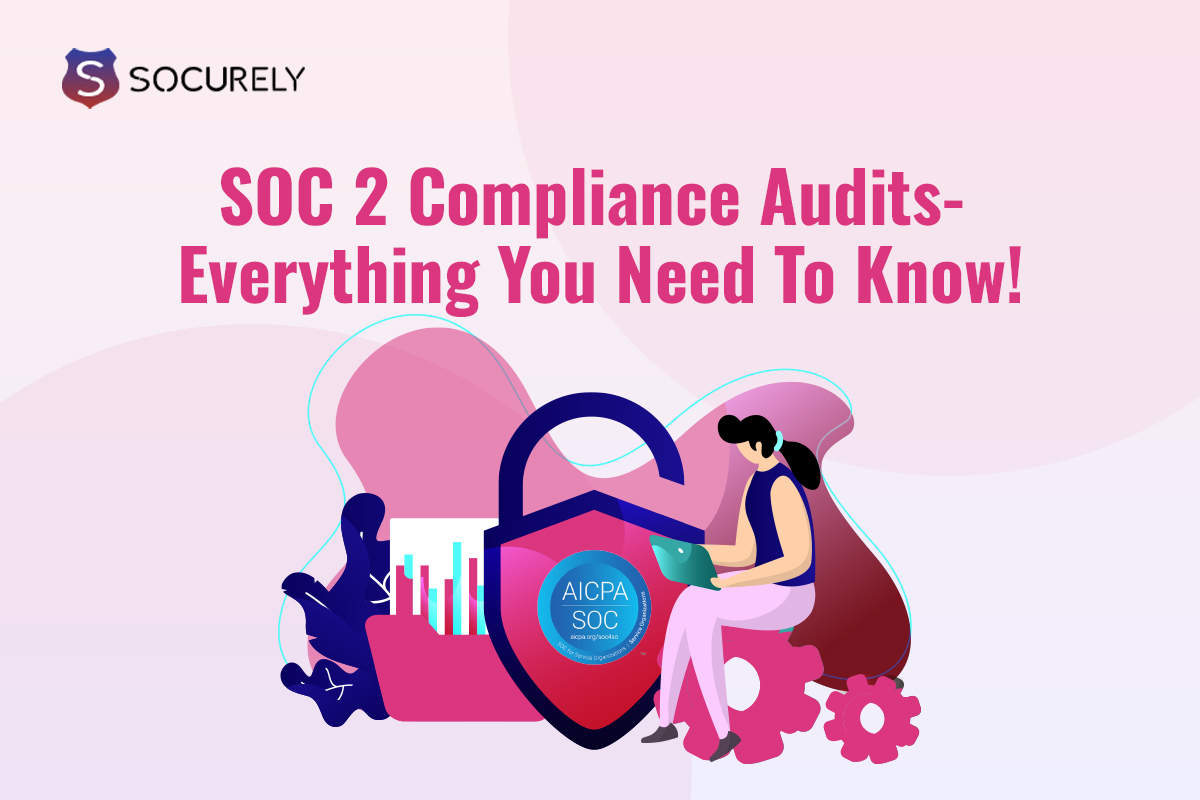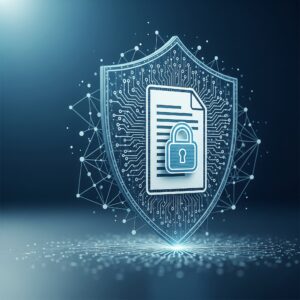You are here which means you are concerned with SOC 2 Compliance Audits. We’ll review all you need to know about SOC 2 audits in this blog, including what they are, why you need them, and how to do one. You will know exactly what the SOC 2 audit process entails, who is involved, how much it will cost, and when it takes after reading this article.
What Is SOC 2 Audit?
SOC 2 compliance audits are designed to ensure that service providers securely manage data to protect the privacy and interests of their clients. Security, availability, processing integrity, confidentiality, and privacy are the five “trust service principles” that form the foundation of SOC 2 compliance, which was created by the American Institute of CPAs (AICPA).
- Security: Makes certain that no unauthorized users may access the system.
- Availability: As promised or agreed upon, the system is ready for usage and functioning.
- Processing Integrity: The approved, full, valid, accurate, and timely processing of the system.
- Confidentiality: Information designated as confidential is protected.
- Privacy: Personal information is collected, used, retained, disclosed, and disposed of by the entity’s privacy notice.
These criteria are essential for organizations that handle sensitive data, as they provide a structured approach to maintaining data integrity and security.
**Note- For example, consider a cloud service provider handling sensitive financial data. Their clients need assurance that their data is protected against unauthorized access and breaches. This is where a SOC 2 audit becomes crucial, offering a detailed evaluation of the provider’s controls and practices.
What Are The Types Of SOC 2 Compliance?
SOC 2 Type 1: Investigates security measures at a particular moment.
SOC 2 Type 2: Evaluates the same controls over an extended time frame (usually six to twelve months).
Since SOC 2 Type 1 reports only evaluate a single point in time, they are simpler and less expensive to complete.
Because SOC 2 Type 2 reports cover more ground, they need more time, money, and resources to complete. Type 2 reports examine a company’s security procedures in greater detail and offer a more thorough audit by evaluating them over time.
Why Completing SOC 2 Audit Is Important?
Neither industry rules nor the law has mandated SOC 2 compliance. That does not, however, imply that they are not worthwhile. SOC 2 audits have become a must for businesses assessing their cloud service providers since they are crucial to risk management, internal governance, and regulatory monitoring.
Client assurance
Businesses want to deal with companies they trust more and more as cyber dangers increase. Consequently, firms that demonstrate SOC 2 compliance have a higher chance of closing more businesses.
SOC 2 audit reports guarantee that businesses are managing client data securely, which will become more crucial as cyber risk rises to the top of the corporate priorities list in 2022. SOC 2 compliance builds client confidence and reassures them about your offerings.
Cost Savings
A SOC 2 audit can save you significantly more money in the long term, even with its hefty upfront cost (about $147,000 for a six-month report). The average cost of a data breach was over $4 million in 2021, and the expenses are still going up.
However, SOC 2 audits highlight an organization’s advantages and disadvantages, assisting businesses in risk mitigation and strengthening their security and compliance positions. Put another way, SOC 2 audits can help you save money in the long run in addition to assisting you in preventing security breaches and data loss.
Security Insights
SOC 2 audits provide more than just pretty reports for storage. They offer insightful information on the governance, security posture, internal controls, and regulatory oversight of your business that you can utilize to further reduce risks, enhance systems, and increase compliance preparedness.
What Is The SOC 2 Audit Process?
The SOC 2 Audit process is broadly categorized into two steps- Preparing the audit, and Completion of audit.
Audit Preparation
Preparation involves understanding the requirements and ensuring that your organization’s policies, procedures, and controls align with SOC 2 criteria. This stage involves understanding the required process, from defining scope to readiness assessment-
- Define Your Scope & Objective
Defining the scope and objective of your business helps to determine which systems, processes, and departments will be included.
To start with, verify the controls that will be included in that scope and the information that the user entity hopes to learn from the audit. You can work with your auditor to determine whether Trust Services Principles apply if you’re unsure. Your team may start working on documenting policies as soon as you have a clear idea of the scope.
- Document Policies & Procedures
Documentation of your information and policies can prevent further risks. This step helps to identify potential threats and vulnerabilities that can tamper with your business. Ensure you perform the documentation following the Trust Service Principles. SOC 2 Auditors use these documented policies and principles to get a clear and comprehensive report. Auditors also identify risks and take active measures to deal with them, following the documents.
Based on the number of principles your business information needs, and controls to apply, this is a lengthy procedure. The more time you give in this step, the better results you can get in the long run. So, it is advisable to perform this with the help of a large team of SOC 2 Audit Experts.
- Readiness Assessment
Gap analysis or readiness assessment helps you to know whether you are ready for the SOC 2 Audit or not. Before the official audit, conduct a readiness assessment to ensure all controls are in place and functioning correctly. In essence, this activity serves as your practice run before the real audit. This can be done internally or with the help of a third-party consultant. The readiness assessment helps identify any last-minute issues that need addressing.
Perform this as your opportunity to assess your procedures and regulations and pinpoint any vulnerabilities or dangers in your system.
Audit Completion
Once you are ready with the procedures, it is mandated to follow the given steps-
- Review Of Audit Scope- Meet with you to go over the scope and make sure it is clear before they begin.
- Creating Project Plan- The auditor will develop a strategy and provide an anticipated project timeframe while keeping the scope in mind.
- Security Control Test- The auditor will next get right into testing your controls to see if they are successful in terms of design and/or functioning.
- Result Documentation- The auditor will note down all the documentation for further reference.
- Giving The Client Report- The auditor will offer a written assessment of your controls along with their final assessment of how well the company is set up to protect data.
What Remains In The SOC 2 Audit Report?
When the SOC 2 audit is complete, the auditor will provide a detailed report. This report includes the following:
- Management’s Description of the System: A comprehensive overview of the system being audited.
- Management’s Assertion: The management’s assertion that the system meets the specified trust service criteria.
- Auditor’s Opinion: The auditor’s opinion on whether the system meets the trust service criteria.
- Description of Tests of Controls and Results: Details of the tests performed and the results.
- Other Information From Service Organization: Any additional relevant information provided by the organization.
Who Performs The SOC 2 Audit?
OC 2 audits must be performed by a licensed CPA (Certified Public Accountant) who has the expertise and experience in information security. Organizations often choose a CPA firm specializing in SOC 2 audits to ensure thorough and accurate evaluations.
To get formal accreditation, an external auditor from a qualified CPA firm must execute a SOC 2 audit, which is governed by AICPA regulations. To maintain neutrality, the CPA should be an expert in information security and fully independent of the company they are auditing. To help with the audit preparation, CPA firms may hire a non-CPA expert with pertinent information security skills. Nonetheless, a CPA must release the final report.
For example, a large tech company might hire a well-known CPA firm with a strong track record in SOC 2 audits to enhance credibility.
-
Supported By The-
An extensive task, a SOC 2 audit will include more than simply your IT or security staff. As you get ready for your SOC 2 audit, consider who will need to participate in the process and what positions will need to be filled, such as:
- Executive sponsor
- Legal
- HR
- IT/Security
- Project manager
- Outside consultant
Get Started With SOC 2 Audits With Socurely
Embarking on your SOC 2 compliance journey can be daunting, but with the right partner, it becomes manageable. Socurely is the best ISO 27001 Compliance Company, offering comprehensive services to guide you through the entire SOC 2 audit process. From initial readiness assessments to continuous monitoring, Socurely ensures that your organization meets all necessary compliance requirements efficiently and effectively.
**Get your SOC 2 Audits with us!
FAQ-
- How Often Should You Prepare SOC 2 Audit?
Organizations should prepare for a SOC 2 audit annually to ensure continuous compliance and address any new risks or changes in their systems.
What Is the SOC 2 Audit Cost?
The cost of a SOC 2 audit varies depending on the scope and complexity of the audit. On average, it can range from $20,000 to $100,000.
For How Long Are SOC 2 Audits Valid?
SOC 2 audit reports are typically valid for one year, after which a new audit is required to maintain compliance.
Is SOC 2 Audit Preparation Time-Consuming?
Yes, preparing for a SOC 2 audit can be time-consuming, often taking several months. However, the benefits of compliance far outweigh the effort involved.
Conclusion
SOC 2 compliance audits are crucial for organizations that handle sensitive data. They provide a structured approach to ensuring data security, building client trust, and mitigating risks. By understanding the audit process and implementing robust controls, organizations can achieve and maintain SOC 2 compliance, ultimately gaining a competitive edge in the market.







